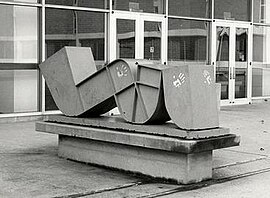Broken Walrus I
| Broken Walrus I | |
|---|---|
 | |
 | |
| Artist | Gary Freeman |
| Year | 1975 |
| Type | Mild Steel |
| Dimensions | 91 cm × 61 cm × 240 cm (36 in × 24 in × 96 in) |
| Location | Indiana University-Purdue University Indianapolis, Indianapolis, Indiana, United States |
| 39°46.390′N 86°10.487′W / 39.773167°N 86.174783°W | |
Broken Walrus I, a public sculpture by American sculptor Gary Freeman, was installed on the Indiana University-Purdue University Indianapolis campus, near downtown Indianapolis, Indiana, in 1975. Located north of the IUPUI Lecture Hall, the sculpture was removed around 2004 after it rusted. The work was fabricated in mild steel, painted an orange-red matte finish, and measured 36-inch (91 cm) tall by 8-foot (2.4 m) long by 24-inch (61 cm) wide.[1]
Description
[edit]Broken Walrus I, a mild steel sculpture with an orange-red painted matte finish, was an abstract representation of a single walrus tusk broken into two pieces. Rather than a realistic, round tusk, it had squared edges and exaggerated, squared ends. To portray the sense of brokenness, the work had two pieces: a larger, main tusk and a smaller section resting against it. The larger section had thin pieces on the sides that radiated from each curve to give it an even more abstract feel. The piece's dimensions were 36-inch (91 cm) by 8-foot (2.4 m) by 24-inch (61 cm); it sat on a raised concrete rectangle base measuring approximately 2-foot (0.61 m) high by 7-foot (2.1 m) long.[1]
A black and white photograph of Broken Walrus I appears in the exhibit catalog Gary Freeman: A Decade of Sculpture 1979 to 1989.[1]
Artist
[edit]Location
[edit]From 1975 until it was removed around 2004, Broken Walrus I was located north of New York Street on the IUPUI campus; north of the IUPUI Lecture Hall and west of Joseph T. Taylor Hall (formerly University College) at 815 W. Michigan Street.[2] Artist Brent Gann's abstract piece, Orange Curves, was installed in the former location of Broken Walrus I.[3][4][5]
Condition
[edit]Around 2004 Broken Walrus I was removed and disassembled due to extreme rust. Because it was in great need of repair, IUPUI's Campus Facility Services approached Valerie Eickmeier, Dean of the Herron School of Art and Design, who contacted Freeman and obtained the artist's permission to remove and disassemble the sculpture.[6]
Broken Walrus I was made of mild steel, a material which corrodes at a faster rate than other forms of steel such as cast iron or stainless steel. Mild steel is commonly used because of its cost, ease of use, strength, and ability to take on more deformation without failing.[7] It also corrodes more quickly in outdoor environments, especially moist atmospheres, and causes increased loss of metal due to rusting the longer it is exposed.[8] Broken Walrus I was displayed outdoors for nearly thirty years, through cycles of harsh, midwestern winters and humid summers, causing the structure to become increasingly corroded until it was more efficient to remove the sculpture rather than repair it.
See also
[edit]References
[edit]- ^ a b c Freeman, Gary (1990). Gary Freeman: A Decade of Sculpture, 1979 to 1989. Indianapolis, IN: Herron Gallery.
{{cite book}}:|work=ignored (help) - ^ "About IUPUI: Taylor Hall". IUPUI. Archived from the original (map) on April 21, 2009. Retrieved November 23, 2009.
- ^ Gann, Brent (2002). "Orange Curves" (photograph). Sculpture. Brent Gann. Retrieved April 26, 2013.
- ^ A second Gary Freeman Walrus piece, Broken Walrus II, was commissioned in 1976 by an Indianapolis real estate developer, Borns Associates. Freeman and a handful of Herron School of Art and Design sculpture students installed multiple monumental works at an apartment complex on the north side of Indianapolis. When new owners acquired the property in the mid-1990s, many of the sculptures were relocated to nearby Pickwick Farms. See Greiff, Glory-June (2005). Remembrance, Faith & Fancy: Outdoor Public Sculpture in Indiana. Indianapolis: Indiana Historical Society Press. p. 183 and 185. ISBN 0-87195-180-0.
- ^ Freeman's Broken Walrus II was donated to the Indianapolis Museum of Art in 1995; accession number 1995.149, with credit listed as "Gift of Robert A. and Susan S. Borns". On December 18, 2008, Broken Walrus II was deaccessioned and disassembled because of extreme rust and instability. The official IMA reason for deaccession is listed as "Not mission relevant", with a declared value of zero. See "Broken Walrus II". Indianapolis Museum of Art. Retrieved November 25, 2009.
- ^ Eickmeier, Valerie. Personal Communication. November 24, 2009.
- ^ Werby, Andrew (2000). "Using Steel for Sculpture". Archived from the original on August 7, 2008. Retrieved November 25, 2009.
- ^ "Steel Corrosion". Corrosion Doctors. Retrieved November 25, 2009.